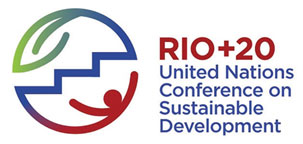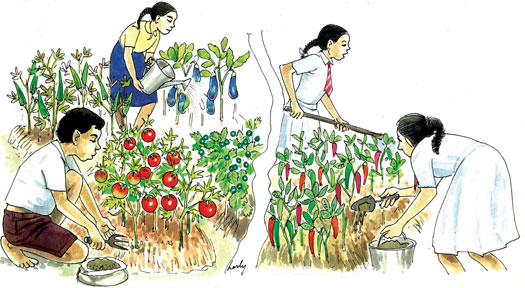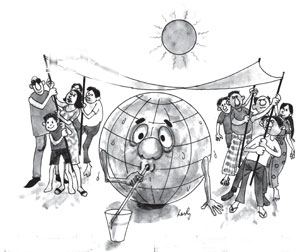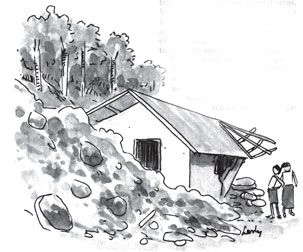|
‘Poverty eradication - greatest global challenge’ -
Part IV:
Facing challenges and seizing opportunities
Text of the final declaration issued by the
world community at the conclusion of the Rio+20 Sustainable Development
Summit recently in Rio de Janeiro, Brazil
Our Common Vision
99. We encourage action at regional, national, sub-national, and
local levels to promote access to information, public participation, and
access to justice in environmental matters, as appropriate.
 100. We emphasize that regional and sub-regional organizations,
including the UN regional commissions and their sub-regional offices,
have a significant role to play in promoting a balanced integration of
the economic, social and environmental dimensions of sustainable
development in their respective regions. 100. We emphasize that regional and sub-regional organizations,
including the UN regional commissions and their sub-regional offices,
have a significant role to play in promoting a balanced integration of
the economic, social and environmental dimensions of sustainable
development in their respective regions.
We underscore the need to support these institutions, including
through the UN system, in the effective operationalization and
implementation of sustainable development, and to facilitate
institutional coherence and harmonization of relevant development
policies, plans and programmes. In this regard, we urge these
institutions to prioritize sustainable development through, inter alia,
more efficient and effective capacity building, development and
implementation of regional agreements and arrangements as appropriate,
and exchange of information, best practices, and lessons learnt. We also
welcome regional and cross-regional initiatives for sustainable
development.
We furthermore recognize the need to ensure effective linkage among
global, regional, sub-regional and national processes to advance
sustainable development. We encourage the enhancement of the UN regional
commissions and their sub-regional offices in their respective
capacities to support Member States in implementing sustainable
development.
101. We underline the need for more coherent and integrated planning
and decision-making at the national, sub-national and local levels as
appropriate and, to this end, we call on countries to strengthen
national, sub-national and/or local institutions or relevant
multi-stakeholder bodies and processes, as appropriate, dealing with
sustainable development, including to coordinate on matters of
sustainable development and to enable effective integration of the three
dimensions of sustainable development.
102. We welcome regional and cross-regional initiatives for
sustainable development, such as the Green Bridge Partnership which is
voluntary and open for participation of all partners.
103. We underscore the need to ensure long-term political commitment
to sustainable development taking into account national circumstances
and priorities and, in this regard, we encourage all countries to
undertake the necessary actions and measures to achieve sustainable
development.
V. Framework for action and follow-up
A. Thematic areas and cross-sectoral issues
104. We recognize that in order to achieve the objective of the
Conference, namely to secure renewed political commitment for
sustainable development, as well as to address the themes of a green
economy in the context of sustainable development and poverty
eradication and the institutional framework for sustainable development,
we commit to address remaining gaps in the implementation of the
outcomes of the major summits on sustainable development, to address new
and emerging challenges and to seize new opportunities through the
actions enumerated below in this framework for action supported as
appropriate through provision of means of implementation.
We recognize that goals, targets and indicators, including where
appropriate gender-sensitive indicators, are valuable in measuring and
accelerating progress. We further note that progress with implementation
of the actions stipulated below can be enhanced by voluntarily sharing
information, knowledge and experience.
Poverty eradication
105. We recognize that, three years from the 2015 target date of the
MDGs, while there has been progress in reducing poverty in some regions,
this progress has been uneven and the number of people living in poverty
in some countries continues to increase, with women and children
constituting the majority of the most affected groups, especially in
least developed countries and particularly in Africa.
 106. We recognize that sustained, inclusive and equitable economic
growth in developing countries is a key requirement for eradicating
poverty and hunger and achieving the MDGs. In this regard, we emphasize
that national efforts of developing countries should be complemented by
an enabling environment aimed at expanding development opportunities of
developing countries. We also emphasize the need to accord the highest
priority to poverty eradication within the United Nations development
agenda, addressing the root causes and challenges of poverty through
integrated, coordinated and coherent strategies at all levels. 106. We recognize that sustained, inclusive and equitable economic
growth in developing countries is a key requirement for eradicating
poverty and hunger and achieving the MDGs. In this regard, we emphasize
that national efforts of developing countries should be complemented by
an enabling environment aimed at expanding development opportunities of
developing countries. We also emphasize the need to accord the highest
priority to poverty eradication within the United Nations development
agenda, addressing the root causes and challenges of poverty through
integrated, coordinated and coherent strategies at all levels.
107. We recognize that promoting universal access to social services
can make an important contribution to consolidating and achieving
development gains. Social protection systems that address and reduce
inequality and social exclusion are essential for eradicating poverty
and advancing the achievement of the Millennium Development Goals. In
this regard, we strongly encourage initiatives aimed at enhancing social
protection for all people.
Food security and nutrition and sustainable agriculture
108. We reaffirm our commitments regarding the right of everyone to
have access to safe, sufficient and nutritious food, consistent with the
right to adequate food and the fundamental right of everyone to be free
from hunger. We acknowledge that food security and nutrition has become
a pressing global challenge and, in this regard, we further reaffirm our
commitment to enhancing food security and access to adequate, safe and
nutritious food for present and future generations in line with the Rome
Principles adopted in 2009, including children under two, and through,
as appropriate, national, regional and global food security and
nutrition strategies.
109. We recognize that a significant portion of the world’s poor live
in rural areas, and that rural communities play an important role in the
economic development of many countries. We emphasize the need to
revitalize the agricultural and rural development sectors, notably in
developing countries, in an economically, socially and environmentally
sustainable manner.
We recognize the importance to take the necessary actions to better
address the needs of rural communities through, inter alia, enhancing
access by agricultural producers, in particular small producers, women,
indigenous peoples and people living in vulnerable situations, to credit
and other financial services, markets, secure land tenure, health care
and social services, education and training, knowledge, and appropriate
and affordable technologies, including for efficient irrigation, reuse
of treated waste water, water harvesting and storage.
We reiterate the importance of empowering rural women as critical
agents for enhancing agricultural and rural development and food
security and nutrition. We also recognize the importance of traditional
sustainable agricultural practices, including traditional seed supply
systems, including for many indigenous peoples and local communities.
110. Noting the diversity of agricultural conditions and systems, we
resolve to increase sustainable agricultural production and productivity
globally, including through improving the functioning of markets and
trading systems and strengthening international cooperation,
particularly for developing countries, by increasing public and private
investment in sustainable agriculture, land management and rural
development. Key areas for investment and support include: sustainable
agricultural practices; rural infrastructure, storage capacities and
related technologies; research and development on sustainable
agricultural technologies; developing strong agricultural cooperatives
and value chains; and strengthening urban-rural linkages. We also
recognize the need to significantly reduce post-harvest and other food
losses and waste throughout the food supply chain.
111. We reaffirm the necessity to promote, enhance and support more
sustainable agriculture, including crops, livestock, forestry, fisheries
and aquaculture, that improves food security, eradicates hunger, and is
economically viable, while conserving land, water, plant and animal
genetic resources, biodiversity and ecosystems, and enhancing resilience
to climate change and natural disasters. We also recognize the need to
maintain natural ecological processes that support food production
systems.
112. We stress the need to enhance sustainable livestock production
systems, including through improving pasture land and irrigation schemes
in line with national policies, legislation, rules and regulations,
enhanced sustainable water management systems, and efforts to eradicate
and prevent the spread of animal diseases, recognizing that the
livelihoods of farmers including pastoralists and the health of
livestock are intertwined.
113. We also stress the crucial role of healthy marine ecosystems,
sustainable fisheries, and sustainable aquaculture for food security and
nutrition, and in providing for the livelihoods of millions of people.
114. We resolve to take action to enhance agricultural research,
extension services, training and education to improve agricultural
productivity and sustainability through the voluntary sharing of
knowledge and good practices. We further resolve to improve access to
information, technical knowledge and know-how, including through new
information and communication technologies that empower farmers, fishers
and foresters to choose among diverse methods of achieving sustainable
agricultural production. We call for the strengthening of international
cooperation on agricultural research for development.
115. We reaffirm the important work and inclusive nature of the
Committee on World Food Security (CFS), including through its role in
facilitating country-initiated assessments on sustainable food
production and food security, and we encourage countries to give due
consideration to implementing the CFS Voluntary Guidelines on the
Responsible Governance of Tenure of Land, Fisheries and Forests in the
Context of National Food Security. We take note of the on-going
discussions on responsible agricultural investment in the framework of
the CFS, as well as the Principles for Responsible Agricultural
Investment (PRAI).
116. We stress the need to address the root causes of excessive food
price volatility, including its structural causes, at all levels, and
the need to manage the risks linked to high and excessively volatile
prices in agriculture commodities and their consequences for global food
security and nutrition, as well as for smallholder farmers and poor
urban dwellers.
 117. We underline the importance of timely, accurate and transparent
information in helping to address excessive food price volatility, and
in this regard takes note of the Agricultural Market Information System
hosted by the Food and Agriculture Organization of the United Nations
and urges the participating international organizations, private sector
actors and Governments to ensure the public dissemination of timely and
quality food market information products. 117. We underline the importance of timely, accurate and transparent
information in helping to address excessive food price volatility, and
in this regard takes note of the Agricultural Market Information System
hosted by the Food and Agriculture Organization of the United Nations
and urges the participating international organizations, private sector
actors and Governments to ensure the public dissemination of timely and
quality food market information products.
118. We reaffirm that a universal, rules-based, open,
non-discriminatory and equitable multilateral trading system will
promote agricultural and rural development in developing countries and
contribute to world food security. We urge national, regional and
international strategies to promote the participation of farmers,
especially smallholder farmers, including women, in community, domestic,
regional and international markets.
Water and sanitation
119. We recognize that water is at the core of sustainable
development as it is closely linked to a number of key global
challenges. We therefore reiterate the importance of integrating water
in sustainable development and underline the critical importance of
water and sanitation within the three dimensions of sustainable
development.
120. We reaffirm the commitments made in the Johannesburg Plan of
Implementation and Millennium Declaration regarding halving by 2015 the
proportion of people without access to safe drinking water and basic
sanitation and the development of integrated water resource management
and water efficiency plans, ensuring sustainable water use.
We commit to the progressive realization of access to safe and
affordable drinking water and basic sanitation for all, as necessary for
poverty eradication and to protect human health, and to significantly
improve the implementation of integrated water resource management at
all levels as appropriate. In this regard, we reiterate these
commitments in particular for developing countries through the
mobilization of resources from all sources, capacity building and
technology transfer.
121. We reaffirm our commitments regarding the human right to safe
drinking water and sanitation, to be progressively realized for our
populations with full respect for national sovereignty. We also
highlight our commitment to the 2005-2015 International Decade for
Action ‘Water for Life.’
 122. We recognize the key role that ecosystems play in maintaining
water quantity and quality and support actions within the respective
national boundaries to protect and sustainably manage these ecosystems. 122. We recognize the key role that ecosystems play in maintaining
water quantity and quality and support actions within the respective
national boundaries to protect and sustainably manage these ecosystems.
123. We underline the need to adopt measures to address floods,
droughts, and water scarcity, addressing the balance between water
supply and demand including where appropriate non-conventional water
resources, and to mobilize financial resources and investment in
infrastructure for water and sanitation services, in accordance with
national priorities.
124. We stress the need to adopt measures to significantly reduce
water pollution and increase water quality, significantly improve
wastewater treatment, and water efficiency and reduce water losses. In
order to achieve this end we stress the need for international
assistance and cooperation.
Energy
125. We recognize the critical role that energy plays in the
development process, as access to sustainable modern energy services
contributes to poverty eradication, saves lives, improves health and
helps provide basic human needs. We stress that these services are
essential to social inclusion and gender equality, and that energy is
also a key input to production. We commit to facilitate support for
access to these services by 1.4 billion people worldwide who are
currently without these services. We recognize that access to these
services is critical for achieving sustainable development.
126. We emphasize the need to address the challenge of access to
sustainable modern energy services for all, in particular for the poor
who are unable to afford these services even when they are available. We
emphasize the need to take further action to improve this situation,
including by mobilizing adequate financial resources, to provide these
services in a reliable, affordable, economically viable, and socially
and environmentally acceptable manner in developing countries.
127. We reaffirm support for the implementation of national and
sub-national policies and strategies, based on individual national
circumstances and development aspirations, using an appropriate energy
mix to meet developmental needs, including through increased use of
renewable energy sources and other low-emission technologies, the more
efficient use of energy, greater reliance on advanced energy
technologies, including cleaner fossil fuel technologies, and the
sustainable use of traditional energy resources. We commit to promoting
sustainable modern energy services for all through national and
sub-national efforts, inter alia, on electrification and dissemination
of sustainable cooking and heating solutions, including through
collaborative actions to share best practices and adopt policies, as
appropriate. We urge governments to create enabling environments that
facilitate public and private sector investment in relevant and needed
cleaner energy technologies.
 128. We recognize that improving energy efficiency, increasing the
share of renewable energy, cleaner and energy-efficient technologies are
important for sustainable development, including in addressing climate
change. We also recognize the need for energy efficiency measures in
urban planning, buildings, and transportation, and in the production of
goods and services and in the design of products. We also recognize the
importance of promoting incentives in favour of, and removing
disincentives to, energy efficiency and the diversification of the
energy mix, including promoting research and development in all
countries, including developing countries. 128. We recognize that improving energy efficiency, increasing the
share of renewable energy, cleaner and energy-efficient technologies are
important for sustainable development, including in addressing climate
change. We also recognize the need for energy efficiency measures in
urban planning, buildings, and transportation, and in the production of
goods and services and in the design of products. We also recognize the
importance of promoting incentives in favour of, and removing
disincentives to, energy efficiency and the diversification of the
energy mix, including promoting research and development in all
countries, including developing countries.
129. We note the launching of the initiative by the Secretary General
on ‘Sustainable Energy for All’, which focus on access to energy, energy
efficiency and renewable energies. We are all determined to act to make
sustainable energy for all a reality, and through this, help eradicate
poverty and lead to sustainable development and global prosperity. We
recognize that countries’ activities in broader energy-related issues
are of great importance and are prioritized according to their specific
challenges, capacities and circumstances, including energy mix.
Sustainable tourism
130. We emphasize that well designed and managed tourism can make a
significant contribution to the three dimensions of sustainable
development, has close linkages to other sectors, and can create decent
jobs and generate trade opportunities. We recognize the need to support
sustainable tourism activities and relevant capacity building that
promote environmental awareness, conserve and protect the environment,
respect wildlife, flora, biodiversity and ecosystems and cultural
diversity, and improve the welfare and livelihoods of local communities
by supporting their local economies and the human and natural
environment as a whole. We call for enhanced support for sustainable
tourism activities and relevant capacity building in developing
countries in order to contribute to the achievement of sustainable
development.
131. We encourage the promotion of investment in sustainable tourism,
including eco-tourism and cultural tourism, which may include creating
small- and medium-sized enterprises and facilitating access to finance,
including through microcredit initiatives for the poor, indigenous
peoples and local communities in areas with high eco-tourism potential.
In this regard, we underline the importance of establishing, where
necessary, appropriate guidelines and regulations in accordance with
national priorities and legislation for promoting and supporting
sustainable tourism.
Sustainable transport
132. We note that transportation and mobility are central to
sustainable development. Sustainable transportation can enhance economic
growth as well as improving accessibility. Sustainable transport
achieves better integration of the economy while respecting the
environment. We recognize the importance of the efficient movement of
people and goods, and access to environmentally sound, safe and
affordable transportation as a means to improve social equity, health,
resilience of cities, urban-rural linkages and productivity of rural
areas. In this regard, we take into account road safety as a part of our
efforts to achieve sustainable development.
133. We support the development of sustainable transport systems,
including energy efficient multi-modal transport systems, notably public
mass transportation systems, clean fuels and vehicles, as well as
improved transportation systems in rural areas. We recognize the need to
promote an integrated approach to policy-making at the national,
regional and local levels for transport services and systems to promote
sustainable development. We also recognize that the special development
needs of landlocked and transit developing countries need to be taken
into account while establishing sustainable transit transport systems.
We acknowledge the need for international support to developing
countries in this regard.
Sustainable cities and human settlements
134. We recognize that, if well planned and developed including
through integrated planning and management approaches, cities can
promote economically, socially and environmentally sustainable
societies. In this regard, we recognize the need for a holistic approach
to urban development and human settlements that provides for affordable
housing and infrastructure and prioritizes slum upgrading and urban
regeneration. We commit to work towards improving the quality of human
settlements, including the living and working conditions of both urban
and rural dwellers in the context of poverty eradication so that all
people have access to basic services, housing and mobility. We also
recognize the need for conservation as appropriate of the natural and
cultural heritage of human settlements, the revitalization of historic
districts, and the rehabilitation of city centers.
 135. We commit to promote an integrated approach to planning and
building sustainable cities and urban settlements, including through
supporting local authorities, increasing public awareness and enhancing
participation of urban residents, including the poor, in decision
making. We also commit to promote sustainable development policies that
support inclusive housing and social services; a safe and healthy living
environment for all, particularly children, youth, women, elderly and
disabled; affordable and sustainable transport and energy; promotion,
protection and restoration of safe and green urban spaces; safe and
clean drinking water and sanitation; healthy air quality; generation of
decent jobs; and improved urban planning and slum upgrading. We further
support sustainable management of waste through the application of the
3Rs (reduce, reuse and recycle). We underline the importance of
considering disaster risk reduction, resilience and climate risks in
urban planning. We recognize the efforts of cities to balance
development with rural regions. 135. We commit to promote an integrated approach to planning and
building sustainable cities and urban settlements, including through
supporting local authorities, increasing public awareness and enhancing
participation of urban residents, including the poor, in decision
making. We also commit to promote sustainable development policies that
support inclusive housing and social services; a safe and healthy living
environment for all, particularly children, youth, women, elderly and
disabled; affordable and sustainable transport and energy; promotion,
protection and restoration of safe and green urban spaces; safe and
clean drinking water and sanitation; healthy air quality; generation of
decent jobs; and improved urban planning and slum upgrading. We further
support sustainable management of waste through the application of the
3Rs (reduce, reuse and recycle). We underline the importance of
considering disaster risk reduction, resilience and climate risks in
urban planning. We recognize the efforts of cities to balance
development with rural regions.
136. We emphasize the importance of increasing the number of
metropolitan regions, cities and towns that are implementing policies
for sustainable urban planning and design in order to respond
effectively to the expected growth of urban populations in coming
decades. We note that sustainable urban planning benefits from the
involvement of multiple stakeholders as well as from full use of
information and sex-disaggregated data including on demographic trends,
income distribution and informal settlements. We recognize the important
role of municipal governments in setting a vision for sustainable
cities, from the initiation of city planning through to revitalization
of older cities and neighborhoods, including by adopting energy
efficiency programmes in building management and developing sustainable
locally-appropriate transport systems. We further recognize the
importance of mixed-use planning and of encouraging non-motorized
mobility, including by promoting pedestrian and cycling infrastructures.
137. We recognize that partnerships among cities and communities play
an important role in promoting sustainable development. In this regard,
we stress the need to strengthen existing cooperation mechanisms or
platforms, partnership arrangements and other implementation tools to
advance the coordinated implementation of the UN Habitat Agenda with
active involvement of all relevant UN entities and with the overall aim
of achieving sustainable urban development. We further recognize the
continuing need for adequate and predictable financial contributions to
the UN Habitat and Human Settlements Foundation so as to ensure timely,
effective and concrete global implementation of the Habitat Agenda.
Health and population
138. We recognize that health is a precondition for, an outcome of,
and an indicator of all three dimensions of sustainable development. We
understand the goals of sustainable development can only be achieved in
the absence of a high prevalence of debilitating communicable and
non-communicable diseases, and where populations can reach a state of
physical, mental and social well-being. We are convinced that action on
the social and environmental determinants of health, both for the poor
and the vulnerable and the entire population, is important to create
inclusive, equitable, economically productive and healthy societies. We
call for the full realization of the right to the enjoyment of the
highest attainable standard of physical and mental health.
139. We also recognize the importance of universal health coverage to
enhancing health, social cohesion and sustainable human and economic
development. We pledge to strengthen health systems towards the
provision of equitable universal coverage. We call for the involvement
of all relevant actors for coordinated multi-sectoral action to address
urgently the health needs of the world’s population.
140. We emphasize that HIV and AIDS, malaria, tuberculosis,
influenza, polio and other communicable diseases remain serious global
concerns, and we commit to redoubling efforts to achieve universal
access to HIV prevention, treatment, care and support, and to eliminate
mother to child transmission of HIV as well as to renewing and
strengthening the fight against malaria, tuberculosis, and neglected
tropical diseases.
141. We acknowledge that the global burden and threat of
non-communicable diseases (NCDs) constitutes one of the major challenges
for sustainable development in the twenty-first century. We commit to
strengthen health systems toward the provision of equitable, universal
coverage and promote affordable access to prevention, treatment, care
and support related to NCDs, especially cancers, cardiovascular
diseases, chronic respiratory diseases and diabetes. We also commit to
establish or strengthen multi-sectoral national policies for the
prevention and control of non-communicable diseases. We recognize that
reducing inter-alia air, water and chemical pollution leads to positive
effects on health.
142. We reaffirm the right to use, to the full, the provisions
contained in the agreement on Trade-Related Aspects of Intellectual
Property Rights (TRIPS), the Doha Declaration on the Agreement on
Trade-Related Aspects of Intellectual Property Rights and Public Health,
the decision of the World Trade Organization General Council of 30th
August 2003 on the implementation of paragraph 6 of the Doha Declaration
on the TRIPS agreement and public health, and, when formal acceptance
procedures are completed, the amendment to article 31 of the agreement,
which provides flexibilities for the protection of public health, and,
in particular, to promote access to medicines for all, and encourage the
provision of assistance to developing countries in this regard.
 143. We call for further collaboration and cooperation at national
and international levels to strengthen health systems through increased
health financing, recruitment, development, training and retention of
the health work force, improved distribution and access to safe,
affordable, effective and quality medicines, vaccines and medical
technologies, and through improving health infrastructure. We support
the leadership role of the World Health Organization as the directing
and coordinating authority on international health work. 143. We call for further collaboration and cooperation at national
and international levels to strengthen health systems through increased
health financing, recruitment, development, training and retention of
the health work force, improved distribution and access to safe,
affordable, effective and quality medicines, vaccines and medical
technologies, and through improving health infrastructure. We support
the leadership role of the World Health Organization as the directing
and coordinating authority on international health work.
144. We commit to systematically consider population trends and
projections in our national, rural and urban development strategies and
policies. Through forward-looking planning, we can seize the
opportunities and address the challenges associated with demographic
change including migration.
145. We call for the full and effective implementation of the Beijing
Platform for Action, the International Conference on Population and
Development (ICPD) Programme of Action and the outcomes of their review
conferences including the commitments leading to sexual and reproductive
health and the promotion and protection of all human rights in this
context. We emphasize the need for the provision of universal access to
reproductive health, including family planning and sexual health and the
integration of reproductive health in national strategies and
programmes.
146. We commit to reduce maternal and child mortality, and to improve
the health of women, men, youth and children. We reaffirm our commitment
to gender equality and to protect the rights of women, men and youth to
have control over and decide freely and responsibly on matters related
to their sexuality, including access to sexual and reproductive health,
free from coercion, discrimination and violence. We will work actively
to ensure that health systems provide the necessary information and
health services addressing the sexual and reproductive health of women,
including working towards universal access to safe, effective,
affordable and acceptable modern methods of family planning, as this is
essential for women’s health and advancing gender equality
Promoting full and productive employment, decent work for all, and
social protections
147. We recognize that poverty eradication, full and productive
employment and decent work for all, and social integration and
protection are interrelated and mutually reinforcing, and that enabling
environments to promote these needs to be created at all levels.
148. We are concerned about labour market conditions and widespread
deficits of available decent work opportunities, especially for young
women and men. We urge all governments to address the global challenge
of youth employment by developing and implementing strategies and
policies that provide young people everywhere access to decent and
productive work, as over the coming decades, decent jobs will need to be
created to be able to ensure sustainable and inclusive development and
reduce poverty.
149. We recognize the importance of job creation by investing in and
developing sound, effective and efficient economic and social
infrastructure and productive capacities for sustainable development and
sustained, inclusive and equitable economic growth. We call on countries
to enhance infrastructure investment for sustainable development and we
agree to support UN funds, programmes and agencies to help assist and
promote developing countries’ efforts, particularly the least developed
countries, in this regard.
150. We recognize the importance of job creation by adopting
forward-looking macroeconomic policies that promote sustainable
development and lead to sustained, inclusive and equitable economic
growth, increase productive employment opportunities and promote
agricultural and industrial development.
151. We emphasize the need to enhance employment and income
opportunities for all, especially for women and men living in poverty
and, in this regard, we support national efforts to provide new job
opportunities to the poor in both rural and urban areas, including
support to small and medium enterprises.
152. We recognize that workers should have access to education,
skills, healthcare, social security, fundamental rights at work, social
and legal protections, including occupational safety and health, and
decent work opportunities. Governments, trade unions and workers, and
employers all have a role to play in promoting decent work for all, and
all should help youth gain access to needed skills and employment
opportunities including in new and emerging sectors. Women and men
should have equal access to opportunities to acquire job skills as well
as to worker protections. We recognize the importance of a just
transition including programmes to help workers adjust to changing
labour market conditions.
153. We also recognize that informal unpaid work, performed mostly by
women, contributes substantially to human wellbeing and sustainable
development. In this regard, we commit to work towards safe and decent
working conditions and access to social protection and education.
154. We recognize that opportunities for decent work for all and job
creation can be availed through, inter alia, public and private
investments in scientific and technological innovation, public works in
restoring, regenerating and conserving natural resources and ecosystems,
and social and community services. We are encouraged by government
initiatives to create jobs for poor people in restoring and managing
natural resources and ecosystems, and we encourage the private sector to
contribute to decent work for all and job creation for both women and
men, and particularly for the youth, including through partnerships with
small and medium enterprises as well as cooperatives. In this regard, we
acknowledge the importance of efforts to promote the exchange of
information and knowledge on decent work for all and job creation,
including green jobs initiatives and related skills, and to facilitate
the integration of relevant data into national economic and employment
policies.
155. We encourage the sharing of experiences and best practices on
ways to address the high levels of unemployment and underemployment, in
particular among youth.
156. We stress the need to provide social protection to all members
of society, fostering growth, resilience, social justice and cohesion,
including those who are not employed in the formal economy. In this
regard, we strongly encourage national and local initiatives aimed at
providing social protection floors for all citizens. We support global
dialogue on best practices for social protection programmes that takes
into account the three dimensions of sustainable development and, in
this regard, we note the International Labour Organization
Recommendation 202 concerning National Floors of Social Protection.
157. We call upon States to promote and protect effectively the human
rights and fundamental freedom of all migrants regardless of the
migration status, especially those of women and children, and to address
international migration through international, regional or bilateral
cooperation and dialogue and for a comprehensive and balanced approach,
recognizing the roles and responsibilities of countries of origin,
transit and destination in promoting and protecting the human rights of
all migrants, and avoiding approaches that might aggravate their
vulnerability.
To be continued
|



